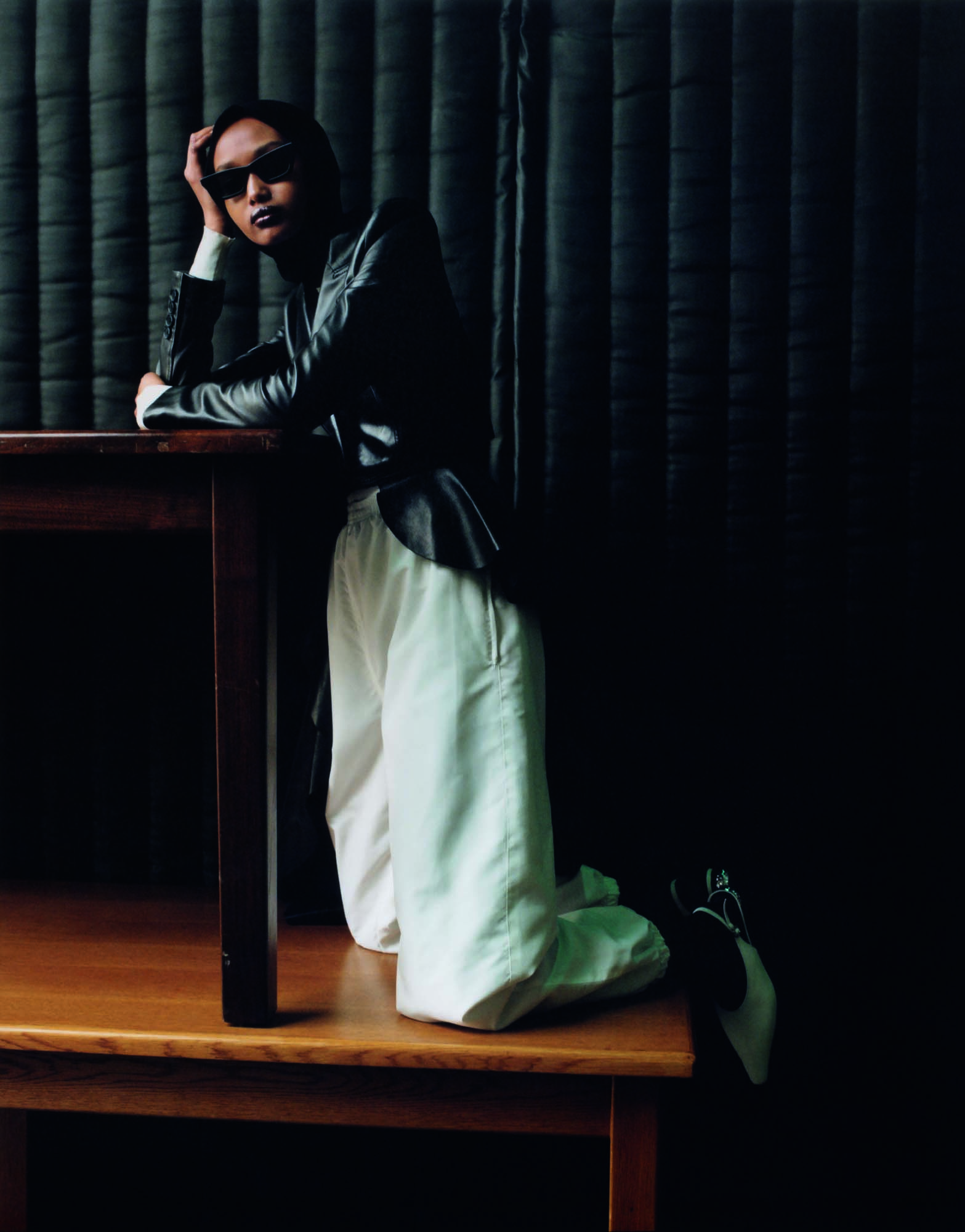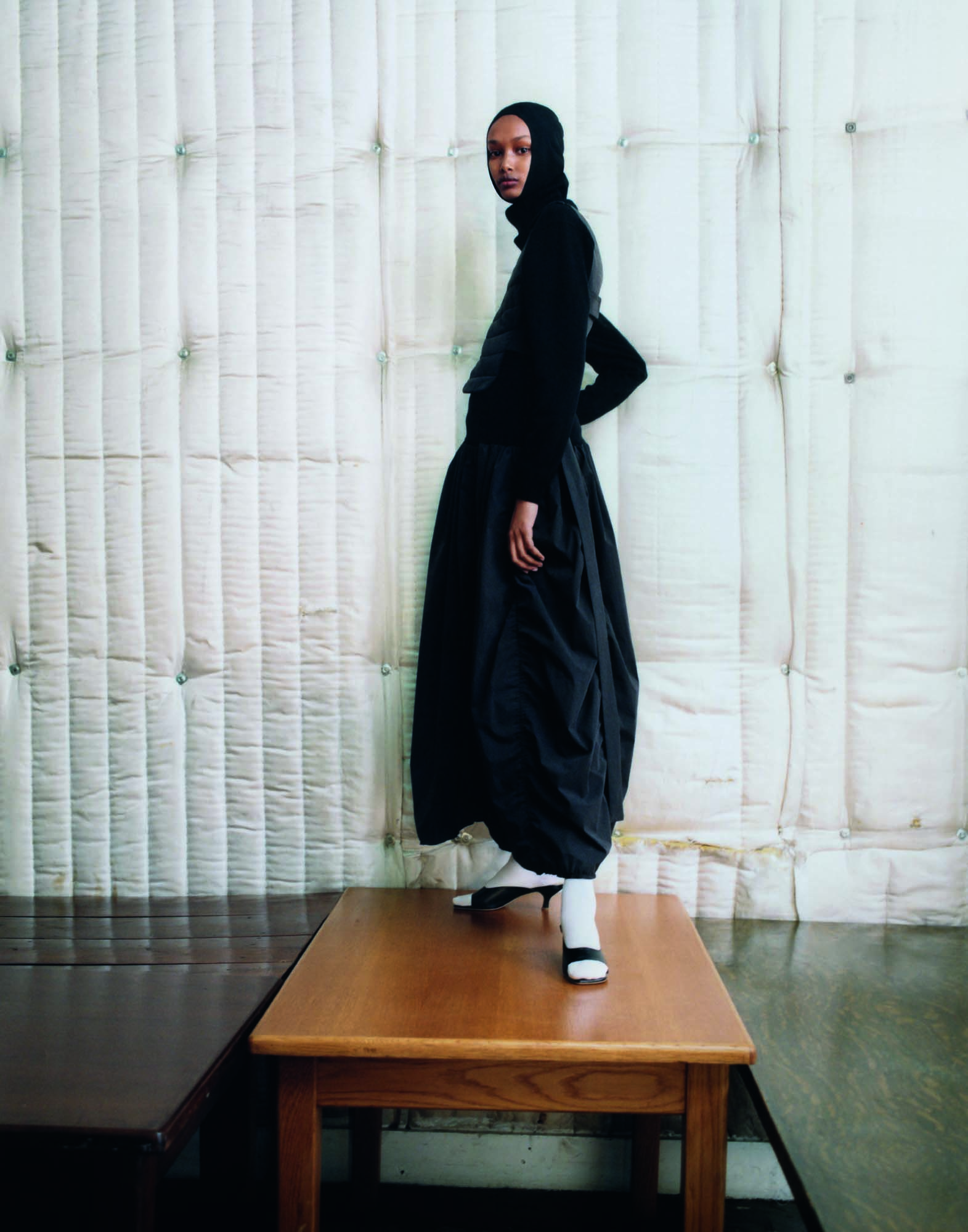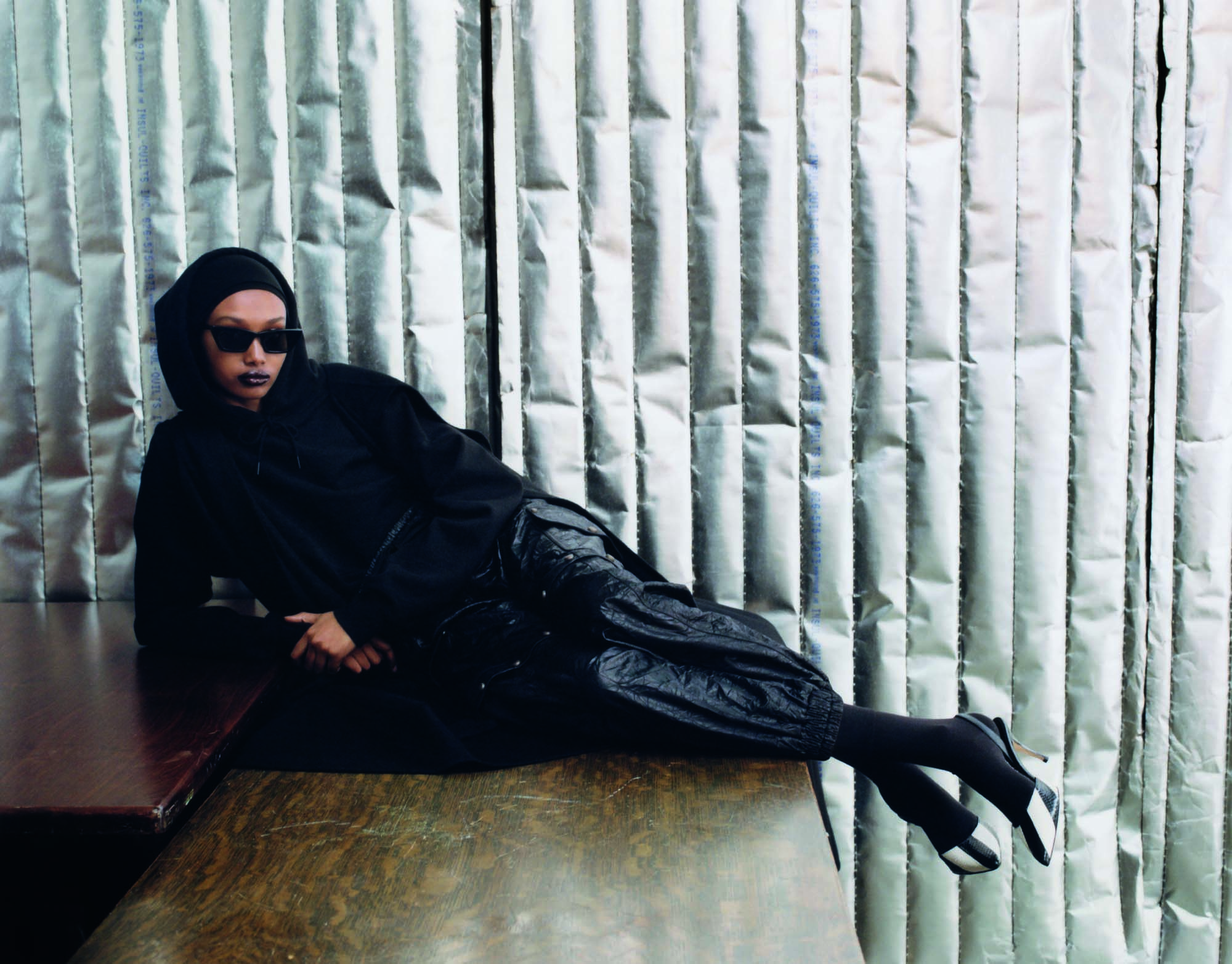This story originally appeared in i-D’s The Voice of a Generation Issue, no. 356, Summer 2019. Buy your copy here.
Earlier this year, British journalist and author Mariam Khan published her critically acclaimed collection of essays, It’s Not About The Burqa, looking at the Muslim female experience across faith, feminism, sexuality and race. Tired of hearing about Muslim women from people who were neither Muslim, nor female, Mariam, like Ugbad Abdi, is determined to use her voice to dispel the myths surrounding the Muslim female experience and in doing so educate people on what it really means to be a Muslim women today. As two inspirational young women in their respective fields, we invited Ugbad and Mariam to talk frankly about the hijab, feminism, lazy stereotyping and the greater representation of Muslim women we need to see in the media today.
Mariam: I wrote It’s Not About the Burqa because of many frustrations at the inaccurate portrayal of Muslim women in the media. The final catalyst for me was when ex-British Prime Minister David Cameron was reported to have said Muslim women were “traditionally submissive” which was not a description of Muslim women I recognised. As a Muslim woman in fashion you are the author of your own narrative?
Ugbad: As a model I have a voice and a space where I can share my story and educate people about why I wear hijab and about being a Muslim woman. It has been easy for me, thankfully, to come into the fashion industry but there are many Muslim women — like Halima Aden — who have made it possible. We need to be the authors of our own stories and be acknowledged — because often Muslim women are talked about, and we’re talked for, but never allowed to speak for ourselves. It’s tiring.
Hijab is a huge part of your identity, as it is mine. If I’m honest, I first wore it because my mother did. I only learnt the importance of hijab when I was a teen. Nobody ever explained it to me. I had to find those answers for myself. I did, and now I actively choose to wear hijab. It is my choice and my body. Why did you decide to wear hijab?
I started to commit to wearing my hijab at the age of 14, it was a choice that I made because I wanted to feel closer to Allah and like you I look up to my mother, who’s been my role model. Growing up, I wanted to be like her, I wanted to look like her and dress like her, so I did. I think nearly all young girls want to be like their mothers and there is a strength in me because of that. My hijab is such an integral part of my identity, it means that the fashion designers, creators and brands who want to work with me respect my choice, because that’s exactly what it is. A choice. By being included authentically and on my terms I know I’m reaching different people and that’s what’s going to make change.
I would feel like a part of me was missing without it, but at the same time being a hijabi Muslim woman is difficult. I love to travel but hate airports so I adjust my hijab when I’m in certain spaces. Not only do you have to contend with concerned feminists who believe you are unable to make your own choices, you have to contend with a judgemental community who will condemn you for showing strands of hair whilst observing faith. Growing up did you feel a lack of female Muslim role models?
I feel like it’s only recently that you see different Muslim women in different fields in the public sphere. Growing up I didn’t see myself reflected anywhere. In the media there was no one who mirrored who I was, so I found it hard to dream big.
Growing up there was nobody who made me feel like they represented me either. Thankfully I too had my mother, and in her I could see everyday a hijabi Muslim woman who was brave, courageous, who would call out shit and had integrity and because I could see that, I could be that. I mean, the first time I read a book with a Muslim hijabi South Asian woman in it, I was 22 and now I’m 26!
I think it’s fantastic that more Muslim women are being celebrated across the media today, I think this will have a huge impact on future generations of Muslim women.

Do you think all representations of Muslim women in the media are good representation?
Sadly I think that representation is not always good. There are two sides to representation. One is where Muslim women are portrayed through negative stereotypes and where we aren’t heard. And then there is the other side, where our stories are highlighted and we are acknowledged. This needs to happen more. I’ve been using my voice, and I’ve found it easy, but it’s not the same for everyone.
Do you think the younger generation of Muslim women care more about representation than the generations before us?
I think Muslim women have always cared about representation, but it’s only now, in the digital world, that we can use our voices to speak out and discuss what is important to us. Muslim women are tired of being misrepresented by the media so we are speaking out more and more.
The stereotypes surrounding Muslim women are vast; they say we can’t be feminists, we can’t be fashionable, we can’t speak for ourselves and that we’re unambitious. I’ve been asked in job interviews if I was an immigrant and if I had a degree despite it saying clearly on my CV that I did. It often appears we can’t be part of the “us” in the Western world, we are always defaulted to the “them”. What are some of the stereotypes you have faced as a Muslim woman?
The most common stereotype I’ve faced is people thinking that I’ve been forced to wear my hijab by my family or by my faith. The main stereotype around Muslim women is that we are oppressed – but I tell people that actually my hijab is my choice and that I wear my hijab for me and my faith.
Who are the Muslim women who inspire you?
There are so many women who have encouraged me to be where I am now. Bethann Hardison, who has worked so hard for Black women to be in the fashion industry. The same goes for models like Iman and Naomi Campbell and the politician Ilhan Omar — they have inspired so many women to be unapologetic for who they are and take up space no matter what other people might think of you. Women like these make me feel like I can dream big.
Do you feel its a pressure or a privilege to be someone who inspires people?
It’s definitely a privilege! I try to use my voice for good. Whenever someone tells me that I inspire them it makes my heart warm because I needed someone to inspire me when I was growing up. There is, of course, a pressure that comes with it. I have people message me all the time to say I’m not a good Muslim, or to tell me that I’m not wearing the hijab right, but the support that I’ve received and knowing I’m making a difference helps me move past it. I’m living my dream and I’m using my platform to say what I wish a Muslim woman had said before me so I felt secure in who I was growing up. This thought helps take the pressure away.

How does your identity as a Muslim woman interact with the fashion industry?
When I started working in fashion, I didn’t know what to expect. But in the short time I’ve been in the industry, I’ve seen that people are open to change and I, as an individual, have felt respected. I started my fashion week in New York and finished it in Paris and I’ve not faced challenges other than some stereotypes which I’ve comfortably challenged. I love educating people. I feel like people have taken an extra step to make me feel comfortable in the spaces I’m in, they are conscious and aware and everyone is willing to make changes if I’m not comfortable. I think my unwillingness to be anything but my authentic self has pushed them. It’s made me hopeful for the future.
What does being a feminist mean to you?
I am still educating myself on what feminism means to me personally and I think this is a journey for every woman to figure out, but I know it involves being a confident, empowered woman.
I hate this question but I’m going to ask you it anyway — do you think you can be a feminist and a Muslim woman?
Islam teaches me everyone should be treated with respect, it doesn’t matter how different they are from you. So therefore I think it is definitely possible to be a feminist and a Muslim woman.
Communities are integral parts of how we identify ourselves. Being South Asian, and slightly older at 26, a lot of the community I grew up in embedded cultural values in religious practice and teachings. In It’s Not About the Burqa myself and contributors call out the Muslim communities and the Western world because like I said, existing as a Muslim woman is like having many battles all the time just to exist, the pushback is suffocating at times but there is no way around it and we must continue to be the authors of our own narratives because anything less is unacceptable. What effect has your community had on your identity?
Thankfully I have a strong support system so I’ve been able to move with confidence and succeed. However, as well as creating spaces outside of our communities I agree that we need our communities to support us, as Muslim women, entering new spaces too.

